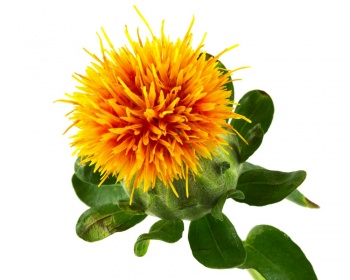Safflower
From Wikiwel
(Redirected from Hong Hua)
Other Names:Alazor, American Saffron, Bastard Saffron, Benibana, Benibana Oil, Benibana Flower, Cártamo, Carthame, Carthame des Teinturiers, Carthamus tinctorius, Chardon Panaché, Dyer's Saffron, Fake Saffron, False Saffron, Hing Hua, Honghua, Huile de Carthame, Kusumbha, Kusum Phool, Safflower Nut Oil, Safflower Oil, Safran Bâtard, Safranon, Zaffer, Zafran, Saffloer
Safflower is a plant. The flower and oil from the seeds are used as medicine.
Special Precautions of Safflower
- Pregnancy and breast-feeding: Safflower seed oil seems to be safe to take by mouth during pregnancy. But don’t take safflower flower. It can bring on menstrual periods, make the uterus contract, and cause miscarriages. There isn’t much information about the safety of using safflower seed oil or flower during breast-feeding. Stay on the safe side and avoid use.
- Bleeding problems (hemorrhagic diseases, stomach or intestinal ulcers, or clotting disorders): Safflower can slow blood clotting. If you have any kind of bleeding problem, don’t use safflower.
- Allergy to ragweed and related plants: Safflower may cause an allergic reaction in people who are sensitive to the Asteraceae/Compositae family. Members of this family include ragweed, chrysanthemums, marigolds, daisies, and many others. If you have allergies, be sure to check with your healthcare provider before taking safflower.
- Surgery: Since safflower might slow blood clotting, there is a concern that it could increase the risk of bleeding during and after surgery. Stop using safflower at least 2 weeks before a scheduled surgery.
- Medications that slow blood clotting (Anticoagulant / Antiplatelet drugs) interacts with Safflower
Benefits and uses of Safflower are
The linolenic and linoleic acids in safflower seed oil might help prevent “hardening of the arteries,” lower cholesterol, and reduce the risk of heart disease. Safflower contains chemicals that may thin the blood to prevent clots, widen blood vessels, lower blood pressure, and stimulate the heart.
- Reducing cholesterol. Taking safflower oil as a dietary supplement seems to lower total and “bad” low-density lipoprotein (LDL) cholesterol. However, it does not seem to lower other blood fats called triglycerides or raise “good” high-density lipoprotein (HDL) cholesterol.
- Fever.
- Tumors.
- Coughs.
- Breathing problems (conditions that affect the breathing tubes called bronchial tubes).
- Blood circulation disorders.
- Pain.
- Menstrual disorders.
- Chest pain.
- Traumatic injuries.
- Constipation.
- Inducing sweating.
- Causing abortions.
